Henry Kissinger- The first of the five people I'll meet in Hell
I'll probably kick Henry Kissinger in the balls
He had never regarded other men as anything but puppets of a sort, created to fill up an empty world. He divided them into two classes: those he greeted because some chance had put him in contact with them, and those he did not greet. But both these categories of individuals were equally insignificant in his eyes.
Guy de Maupassant, An Old Man
Whatever may be done to guard against interruptions of supply and to develop domestic alternatives, the U.S. economy will require large and increasing amounts of minerals from abroad, especially from less developed countries. That fact gives the U.S. enhanced interest in the political, economic, and social stability of the supplying countries. Wherever a lessening of population pressures through reduced birth rates can increase the prospects for such stability, population policy becomes relevant to resource supplies and to the economic interests of the United States.
Henry Kissinger
I was always taught never to speak ill of the dead, and I generally believe that. After all, the deceased can’t defend themselves. But there was something especially calculating and evil about Henry Kissinger, something that makes it easy for me to suspend my rule and willingly- nay, eagerly- speak ill of him.
Death finally claimed Kissinger yesterday. He somehow made it to 100, which makes me wonder why the purely evil ones seem to live such long lives. How is it that someone who held the lives of so many millions to be of so little value enjoyed such a lengthy existence himself?
To say that Kissinger’s living to 100 was a cruel joke played upon humanity would be something of an understatement. Few have been more deserving of a war crimes trial, followed by a cigarette and a blindfold.
Former US secretary of State, national security advisor, and Nobel Peace Prize co-winner Henry Kissinger — that last was the reason Tom Lehrer gave for retiring, reasoning that “political satire became obsolete” — died yesterday at his home in Connecticut at the age of 100. If you’d like a sober balanced obituary, here’s a gift link to the Washington Post’s; for a more honest assessment, though, you’ll want to read Spencer Ackerman’s scathing assessment at Rolling Stone, for which Ackerman says he had the headline prepared well in advance: “Henry Kissinger, War Criminal Beloved by America’s Ruling Class, Finally Dies.” The story is tagged with the entirely justified heading “Good Riddance.”
Ackerman notes that in the official record, the worst mass murderer ever executed in American history was TimothyMcVeigh, the white supremacist whose bombing of the Murrah federal building in Oklahoma City killed 168 people, 19 of them children.
Yes, but as Ackerman points out, while McVeigh, in his own twisted, psychotic way, thought he was saving America, Kissinger had the advantage of economy of scale. Kissinger, through his decisions and indifference, killed on a scale McVeigh could never have attained in his wildest fever dreams.
McVeigh, who in his own psychotic way thought he was saving America, never remotely killed on the scale of Kissinger, the most revered American grand strategist of the second half of the 20th century.
The Yale University historian Greg Grandin, author of the biography Kissinger’s Shadow, estimates that Kissinger’s actions from 1969 through 1976, a period of eight brief years when Kissinger made Richard Nixon’s and then Gerald Ford’s foreign policy as national security adviser and secretary of state, meant the end of between three and four million people. That includes “crimes of commission,” he explained, as in Cambodia and Chile, and omission, like greenlighting Indonesia’s bloodshed in East Timor; Pakistan’s bloodshed in Bangladesh; and the inauguration of an American tradition of using and then abandoning the Kurds.
It’s something that hasn’t been widely discussed among Presidential historians or brought to the public’s attention. Still, Henry Kissinger is, whether directly or indirectly, responsible for a genocide that killed between three and four million people between 1969 and 1976.
Think about that for a moment. Adolf Hitler’s Third Reich killed six million Jews during WWII, and the Allies executed many of his lieutenants. Henry Kissinger had a hand in the deaths of 3-4 million people and…crickets. Nothing. Not a word about a war crimes tribunal or any other avenue of accountability.
Until his death, Kissinger was hailed by the diplomatic community as a great statesman and diplomat who brought nations together and negotiated treaties. His complicity in genocide is rarely, if ever, mentioned.
But for an honest accounting of his accomplishments, genocide can’t be ignored. His legacy is soaked in the blood of the poor and oppressed.
Many of his decisions while involved in the American government have ramifications to this day in various countries. While Kissinger is praised for his efforts for peace in the Middle East and negotiating a ceasefire for the Vietnam War, the latter of which earned him a Nobel Peace Prize, many Americans called for him to be arrested for war crimes. Bernie Sanders has even accused Kissinger of creating "one of the worst genocides in the history of the world".
The genocides Kissinger remains most infamous for include
Argentina- Kissinger proved U.S. approval for Argentina’s “Dirty War.” In March 1976, a neo-fascist military junta overthrew the country’s socialist President. When the “Dirty War” began, opponents of the junta were killed, tortured, or were simply “disappeared” forever. Kissinger green-lighted this strategy.
Bangladesh- In 1970, politicians who wanted an independent East Pakistan won elections. However, General Agha Muhammad Yahya Khan arrested the party leader and ordered a violent crackdown against the protestors. Khan and his allies interpreted Kissinger’s silence on the matter as tacit approval for the violence, which is precisely what it was.
Cambodia- White House Chief of Staff H.R. "Bob" Haldeman stated that Kissinger and Nixon were "really excited" to bomb Cambodia. It was 1969 and the height of protests against the Vietnam War. Technically, The U.S. wasn’t at war with Cambodia, and Congress hadn't authorized carpet-bombing against the country. But the Communist Khmer Rouge supported the North Vietnamese, and so Operation Breakfast dropped 540,000 tons of bombs on Cambodian territory Kissinger claimed was “uninhabited.” It wasn't, and between 150,000 and 500,00 Cambodians were killed.
Chile- Socialist President Salvador Allende was in power, and Kissinger wasn't a fan. He schemed to destabilize the country and start a military coup. After the commander-in-chief of the Army was assassinated, General Augusto Pinochet stepped into the void and created a dictatorship. Kissinger heartily approved. In 1976, during a private conversation with Gen. Pinochet, Kissinger told him, “My evaluation is that you are a victim of all left-wing groups around the world and that your greatest sin was that you overthrew a government which was going communist.”
East Timor- East Timor was moving towards independence from Portugal. Indonesian President Suharto didn’t like the idea and planned to invade East Timor. On December 6, 1975, Kissinger and President Gerald Ford met with Suharto in Jakarta and told him they wouldn’t “press him on the issue.” The invasion resulted in the death of 200,000 people.
Not exactly a list of greatest hits, but the blood from these countries and more stained his hands, if not his conscience.
There can be no doubt that Henry Kissinger wasn’t a warm and fuzzy sort. He viewed the world through the lens of Realpolitik,
the approach of conducting diplomatic or political policies based primarily on considerations of given circumstances and factors, rather than strictly following ideological, moral, or ethical premise
The fact that lives may be at stake didn’t factor into consideration when considering the big picture. The world was a chess board, and Kissinger was about moving chess pieces around to obtain maximum advantage. If that meant getting into bed with characters some found amoral and/or objectionable, so be it. Kissinger was looking at the bigger picture, and sentimentality only served to cloud judgment. If a few eggs had to be broken (or lives lost), such was the cost of doing business in the world.
I was no fan of Henry Kissinger during his time in power, and I’m certainly not going to metaphorically throw roses on his coffin now. The man deserves a reserved parking space in Hell.
I do love this from Rolling Stone. Why pull punches and play nice?
I don’t know that I could agree with that sentiment more. May he roast eternally in the BBQ pits of Hell.
And I could not love Matt Bors more right now:
It was 1970s American foreign policy that helped give America its lousy reputation as the 800-lb. gorilla that it frankly deserved. I felt it when I lived in Cyprus and traveled throughout the Middle East in the mid-’80s. To be an American was to be reviled in some places. Even before I was known as a person, I was hated because of my passport. It was something I learned to live with, and I took the appropriate precautions.
I got used to wearing clothing that didn’t have American logos, and since I’d grown up about 90 miles south of the Canadian border, it was easy for me to pass myself off as being from the Great White North. Everyone loved Canadians, so everyone got along famously when I told people I was from Manitoba.
It was only about 90 miles from the truth.
Henry Kissinger’s Realpolitik, while intended to make it easier for America (particularly American commercial interests) to exert influence around the world, made it more challenging for those living and traveling outside the U.S. I became skilled at not attracting attention.
While many in the diplomatic world sing Kissinger’s praises, I’m not about to join them. Henry Kissinger’s legacy is soaked in blood, which much of the world seems unwilling to acknowledge. Instead of being exalted as a genius, he should have been hauled before a war crimes tribunal in the Hague.
Instead of a tribute, Kissinger should have been served a cigarette and a blindfold. At least now, perhaps the story of America’s worst and most notorious war criminal will be told.
Go to Hell. Go directly to Hell. Do not pass “GO.” Do not collect $200. When you get to Hell, give Henry Kissinger a swift kick in the balls.
He deserved far worse.
(All of my posts are now public. Any reader financial support will be considered pledges- support that’s greatly appreciated but not required to get to all of my work. I’ll trust my readers to determine if my work is worthy of their financial support and at what level. To those who do offer their support, thank you. It means more than you know.)
And now for a word from our sponsor….





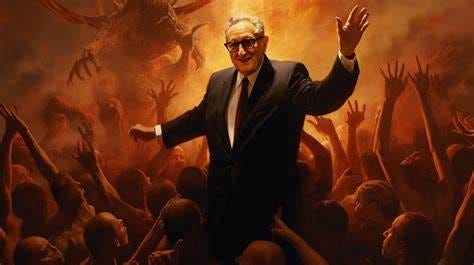
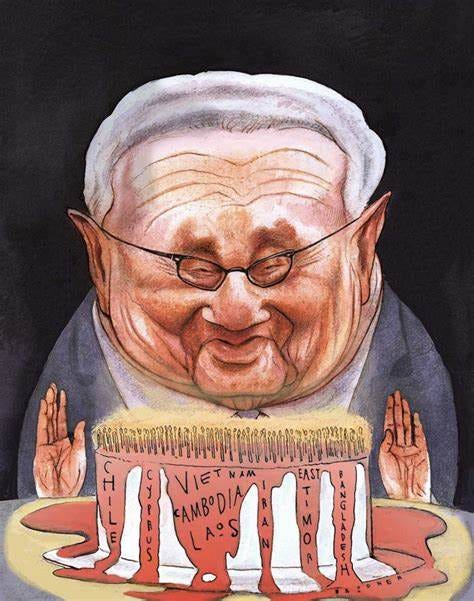
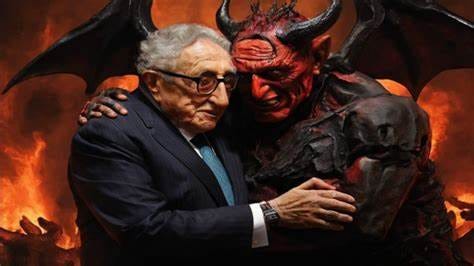
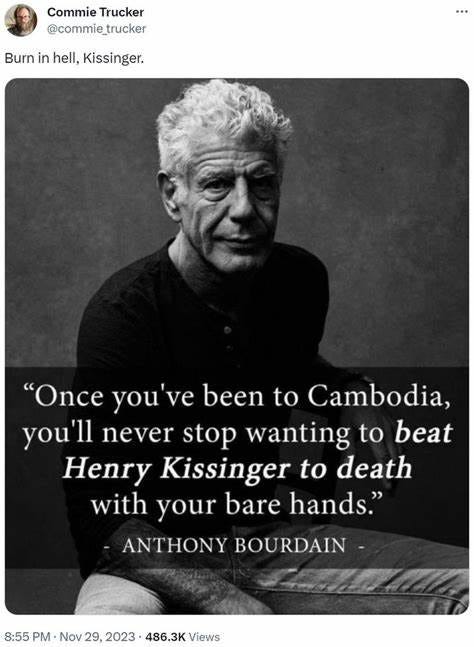
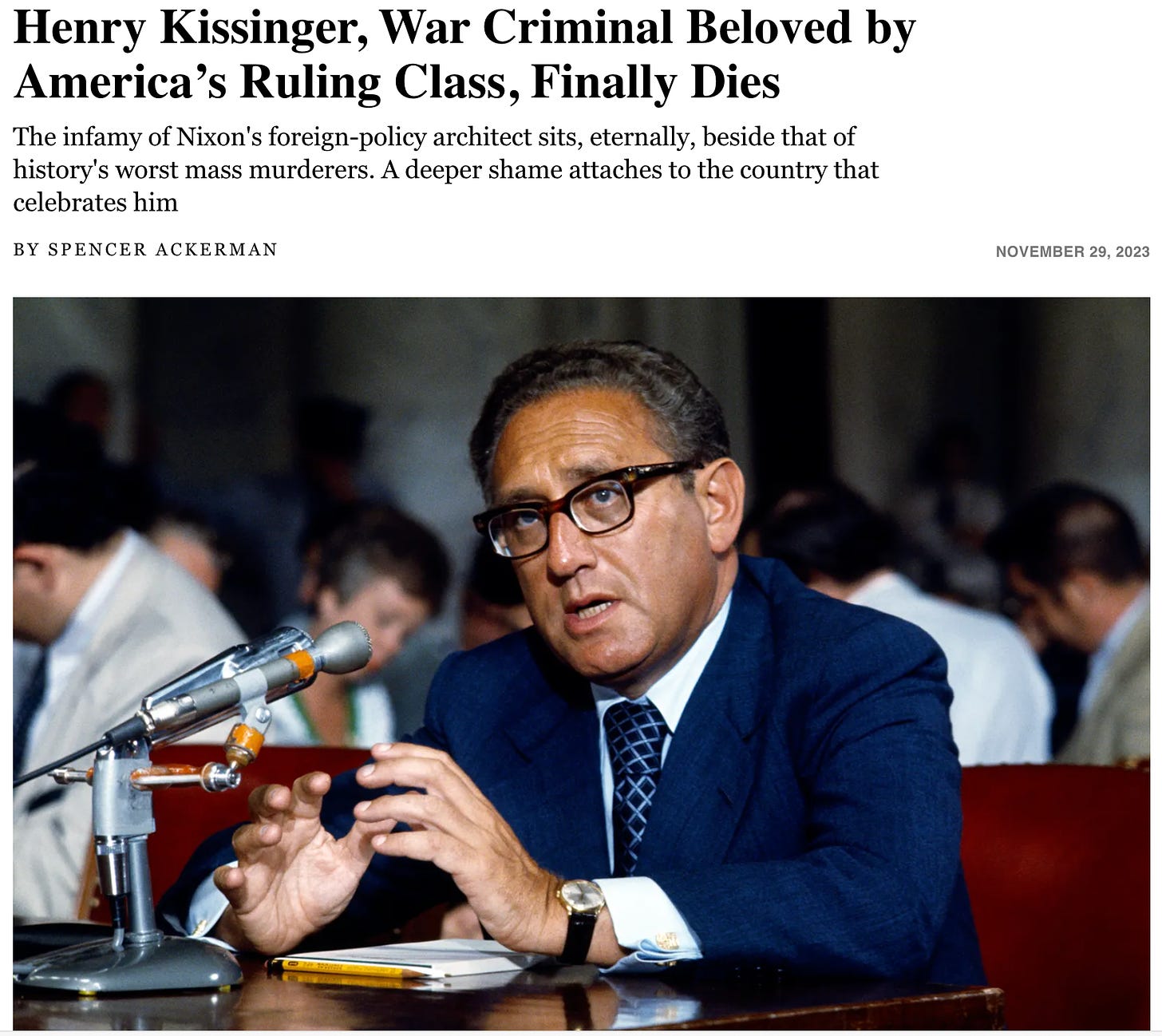
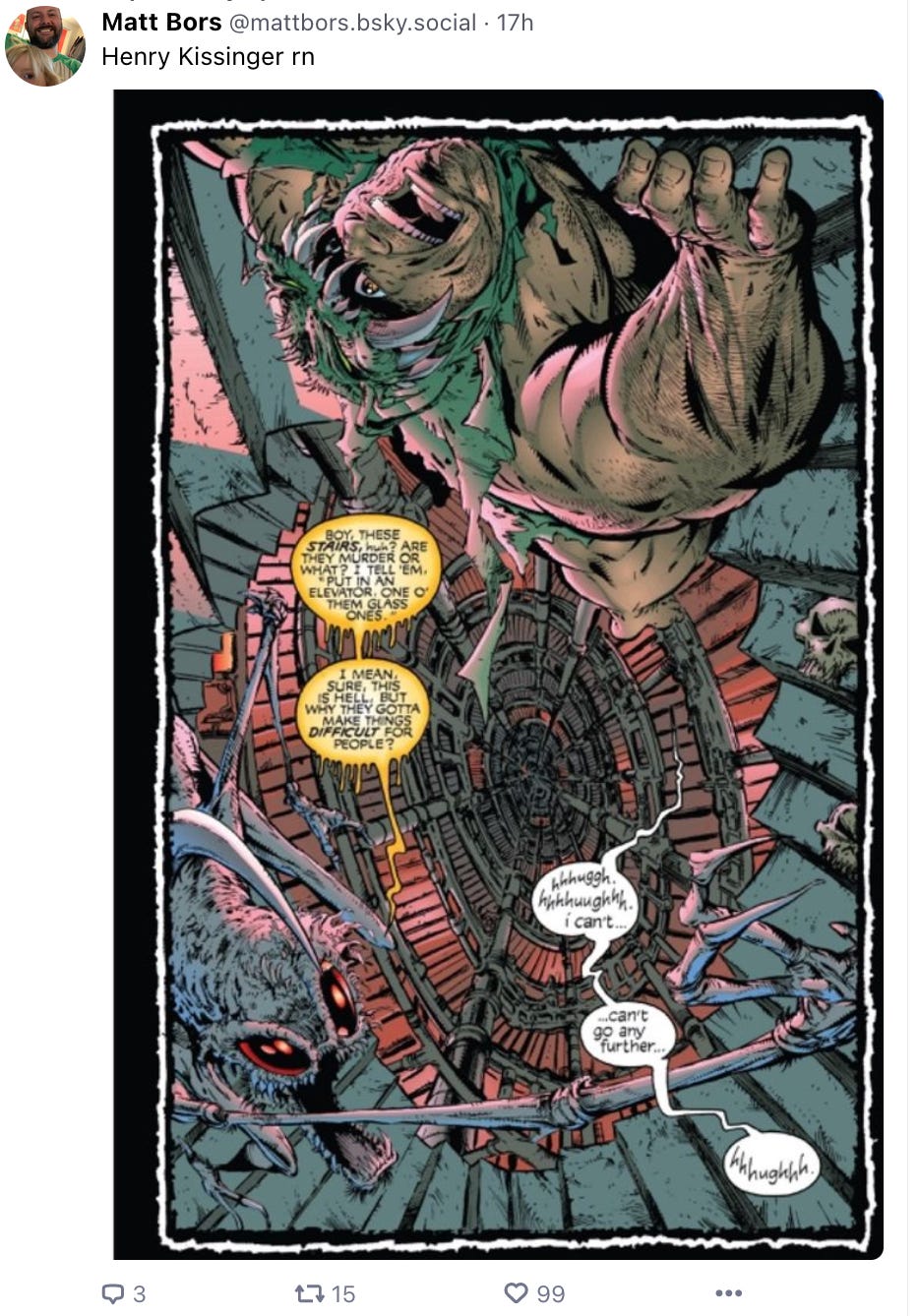


No way to understate the profound hate I had for this man, Trumpian in every respect.